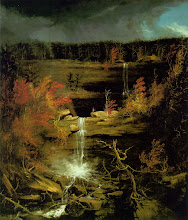Summary:
Longinus offers writers advice on how to aspire to write so as to "take men out of themselves" through imitation, images, and figures of speech (I). He also notes how the use of dialogue and the use of the present tense adds energetic drama. In addition, he warns against "flourishes" (XXXVIII) as well as the superficiality of his own wealthy age.
Assumptions - Shared Values:
Art takes work/effort.
Dialogue helps clarify ideas.
Writers should be readers first.
Greeks rule (over Romans).
New Values:
Tradition takes precedence over novelty.
Larger cultural shifts affect artists (wealthy society lessens the quality of art).
Questions:
What is the critic's role in a pre-printing press society? Because this writing is new to me, I had considered criticism a newish field. Apparently not.
Links:
First of all, I found it somewhat funny that in teaching key elements of narrative writing this past week, I talked about "the big 5." Longinus writes of "five principal sources" from which "all sublimity is derived" (VIII). Though not exactly the same, our lists have some overlap.
Because of his style and clear examples, I found Longinus to be an easier read and more concrete than the others (especially Aristotle). Like Aristotle, Longinus believes that the "pursuit of novelty" lessens the quality of writing (V).
As with Plato's portrayal of Socrates in Symposium, Longinus argues that passions should be tempered by reason (II). This suggestion reminds me again of Romeo and Juliet as well as Sense and Sensibility, where characters without balance pay a price (well, in Romeo and Juliet, everyone pays a price).
Subscribe to:
Post Comments (Atom)
.jpg)
.jpg)
.jpg)
No comments:
Post a Comment